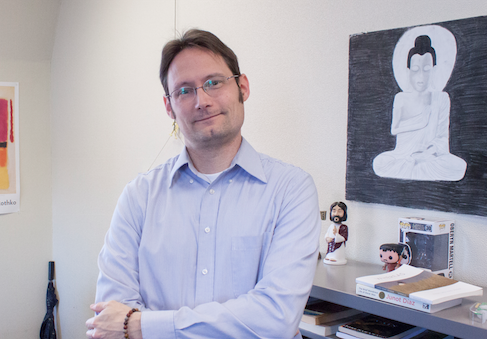Dylan Morris, The Whetstone
When Junior Tim Frost sat down with his adviser to discuss what classes he needs to register for in the spring, he wanted to get as many of his Level 3 core classes out of the way as possible.
Once he looked at the short list of classes available to him, however, he quickly realized all of them conflicted with his nursing classes.
“I deciding that nursing was the more urgent,†Frost said. “I just hope core classes will be available next fall.â€
The difficulty of getting into these core classes is not a problem Frost has alone. Many students, either through time conflicts or a lack of open seats, have had trouble getting into these classes.
Wesley College follows a tiered system of core classes that students must complete to graduate. Students must choose between two different concentrations once they hit Level 3 classes, Identifying with Diversity (ID) and Personal, Social, and Ethical Responsibility (PSER). The problem is that students who pick the PSER concentration have only five classes to compete for while the ID concentration has 16.
This system causes the later, Level 3 courses, to be highly competitive among juniors and seniors trying to graduate on time.
This has caused the already-difficult-to-get-into courses to be even more challenging for anyone in the PSER concentration.
The difficulty of getting into PSER course has forced senior Joyrenzia Cheatham to switch her concentration.
“I needed to complete two more courses, but only one on the list actually fit my schedule,†Cheatham said. “With help from my advisers I was able to transfer my one completed class over to the other concentration.â€
“The inequality of Level 3 offerings is something we know we need to examine,†Brantley Craig, assistant professor of English and Religion, said.
“300-Core courses must be approved by the Core Curriculum faculty committee,†Craig, who heads the committee, said. “Instructors indicate on their proposal forms which concentration they wish the course to be placed in.â€
Craig said the faculty committee encourages faculty involvement in the core, but it is ultimately a voluntary decision that instructors make. Craig said he was aware that some faculty are planning to propose courses in the PSER concentration next fall.
“The Core is still relatively new and is a work in progress,†he said. “The committee is still evaluating it and discussing is as we see how it functions in practice.â€
Aside from schedule conflicts, the lack of courses in the PSER concentration means that those classes fill up fast once registration opens.
Dr. Alban Urbanas, professor of Philosophy and French, had one of his two PSER courses fill up almost immediately.
“The PH315 (Environmental Ethics) course filled quickly for the spring 2018 semester, though the PH310 (Existentialism) course is taking longer to fill,â€Â he said. “This is due, in part, to a computer error that restricted enrollment in the PH310 course during the first week or so of spring 2018 registration.â€
This error has since been resolved and, as of the writing of this story, some seats still remain open in PH310.
If a student is unable to register for a Level 3-core class, he or she may contact the instructor for that class to try and get into it.
Rebecca Benson, an associate professor in Nursing, said she tries to be as accommodating to students as possible.
“Last year, my class filled up with an initial cap of 18 in a couple of days,†Benson said of her NR 304 Palliative Nursing Care class. “We added students upon request and ended up with 42 in the class.â€
For the spring semester, Benson has already expanded her class from the original 20 seats to 30.
Dr. Stephanie Holyfield, associate professor of History, said she has already signed forms for three additional students in her HI 351 Money and Sex class.
“The class was full within a day, but I’m a big softie for sad stories so it always overfills,†Holyfield said. “The previous two times I taught the class, there was a waiting list.â€
Urbanas said students can wait till the spring semester begins.
“Students should monitor the dropping and adding of courses during the first week of classes, should they wish to add classes,†Urbanas said.





